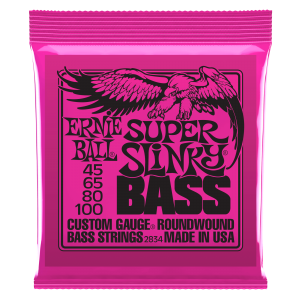When it comes to bass guitar strings, there are a number of options to choose from: different alloys, different coatings, different windings, etc. One choice in particular has been the subject of debate for decades — should I be using roundwound bass strings, or the flatwound variety?
The differences mostly boil down to personal preference, and have an effect on three primary aspects: tone, feel and durability. We’ve put together this handy guide to help point you in the right direction as to which option may be the best for you, including our Slinky Flatwound bass strings, which provide the sound of a roundwound string with the feel of a flatwound.



Tone
Tone is arguably the most important aspect of any instrument strings. Regardless of what they feel like and how long they last, if they don’t sound good its a moot point.
Here’s a breakdown of how tone tends to be affected by the winding style of the string:
Roundwound
Brighter
More sustain
More of a ringing, open sound
Traditional Flatwound
Mellow, softened
Similar to a stand-up bass
Less finger sliding noise
Slinky Flatwound
Expressive
The tone is shaped by your fingers; how you play determines your sound

Feel
Feel can be just as important as tone for certain players. We’ve probably all had the experience of playing poor quality or heavily worn strings; it’s not entirely pleasant. Finding the type of string that feels best for your hands and your particular playing style can make a world of difference in regard to your overall playing experience.
Here’s a breakdown of how feel tends to be affected by the winding style of the string:
Roundwound
More texture
More precision and control
Most flexible
Traditional Flatwound
Smooth texture
Easy slides
More rigid, takes more effort to bend
Slinky Flatwound
Similar texture to traditional flatwound
Medium flexibility

Durability
How long a set of strings lasts can make an enormous difference, both in regard to the cost of playing your instrument as well as the way the strings sound once they are broken in and start to wear.
Here’s a breakdown of how durability tends to be affected by the winding style of the string:
Roundwound
Tend to wear more quickly than flatwound
Less costly
Traditional Flatwound
Tend to wear more slowly than roundwound
Silk winding over ball end and tail to protect instrument and hands from sharp edges of ribbon
More costly
Slinky Flatwound
Tend to wear more slowly than roundwound
Silk winding over ball end and tail to protect instrument and hands from sharp edges of ribbon
More costly

Conclusion
As with so many aspects of playing bass, choosing the right style of strings ultimately comes down to personal preference. As a general rule, roundwound strings tend to be brighter sounding, more flexible and less expensive; traditional flatwound strings tend to be warmer sounding, smoother feeling and more durable; and our Slinky Flatwound strings tend to be a great middle of the road option for those who don’t find that either traditional roundwound or flatwound strings meet all of their needs.
There’s no right or wrong answer, so test drive each type for yourself and experience all that they have to offer.
Watch our Flatwound Strings in Action
Mike Herrera of MxPx demonstrates the Ernie Ball Slinky Flatwound electric bass strings. Flat feel. Round sound. Famously Slinky. Try a set.


